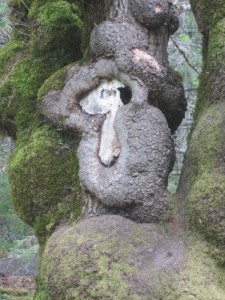Half a block past the entrance to the Butchart Gardens, the van crunched onto the side of Wallace Road. The three of us, all local teenagers, crawled out to the gravel pathway between the wall of trees and the empty road.
We pulled up our coat zippers and clicked on our flashlights. Mine, a police flashlight that was half searchlight and half nightstick, painted a full silver circle on the trail’s edge. It made me confident against all possible predators as we hiked down the slope into the mouth of Gowlland Tod Provincial Park.
My friends shone their beacons onto the sides of the trail. The rusted machinery and concrete structures of BC’s first cement factory protruded from the shadows like pale, bloody fangs, tangled in webs of back boughs, lichen, and moss.
I kept my light forward, illuminating the trail. With its bulb clenched in my palm, I kept the heavy handle propped on my shoulder in case I should need to swing. I did not turn my head, and when I talked I raised my voice to drown out the cracks and rustles of the brush.

I ridiculed whatever creature was stalking us and dared it to come sprinting and screaming at me.
Ten tense minutes later, the trail opened up into the Camas Meadow, overlooking the inky black surface of Tod Inlet. We scuttled towards the outhouses, and I shone my light at a large warty maple: the “Snoopy tree.”
I am shocked by residents who have never heard of it. The bulbous, misshapen lumps of its bark split open to reveal a pale standing dog with a black, perfectly shaped ear formed from a bug- or bird-worn hole. I never walk Tod Inlet without stopping to see Snoopy emerging from the wood.
After a much-needed bathroom break, we bypassed the dock, because until the moon slips behind the mountain at around 10 or 11, its beams reflect on the water’s surface and outshine the bioluminescence.
We slid down a rocky ledge in the shadows of the picnic grove. We gathered piles of pebbles and tossed them at the murky, algae-covered surface: a breeding ground for plankton. Every splash drew a squeak from us since, although they were dim, the plankton would give off a transient teal glow with every well-thrown stone.
One of the girls froze and whispered, “Did you hear that?”
We all stiffened and tilted our heads. Was it footsteps that we heard behind us? An animal scuttling? The wind? I squeezed my flashlight to remind myself that I was armed. We climbed up using roots and protruding rocks as hand and footholds, and then we waved our beams around in paranoia. We found nothing.
The moon was finally hiding, so we lay down on the dock belly-first. I rolled up the sleeves of my dad’s sweater and plunged my arms past my elbows into the mild saltwater, and gasped as plankton exploded like stardust from my hands. We waved our hands around and scared a sculpin against the side of the dock. The fish darted for the sea floor, lit up with a bright blue-green coating on its way down. We scooped up and threw handfuls of water that bespattered the surface with the brief image of a galaxy.
At midnight, our way back up the trail was worse than before. My friends scoured the sides of the walkway with their flashlights and twitched at every sound while I was busy feigning bravado. Then a girl gasped, “I see eyes. Green eyes. What do green eyes mean?”
Pretty sure that green eyes meant herbivore, but not entirely certain, we picked up the pace and ran for the van.
